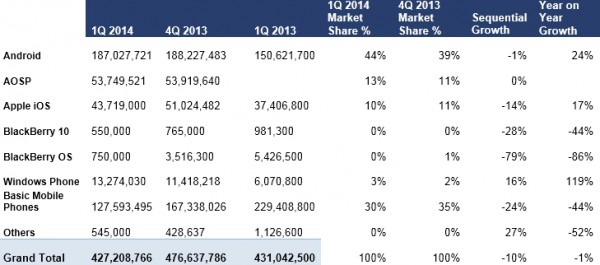The force is still (too) strong with Android, iOS in the smartphone market

Any efforts to break the Android and iOS duopoly in the smartphone market appear to be for naught as the pair continues to take the lion's share of shipments and sales. Even third place occupant Windows Phone struggles to gain significant territory, despite higher unit volumes.
A new report from ABI Research shows Android, iOS, and Windows Phone shipments grew in Q1 2014, compared to the same period from 2013. Despite this increase, Apple's platform lost share quarter-over-quarter, dropping from 11 percent to 10 percent. Meanwhile, Android and Windows Phone's shares grew, sequentially, to 44 percent from 39 percent, and to 3 percent from 2 percent, respectively. The numbers are lower than what the likes of IDC report because ABI Research's data combines smartphone and phone shipments.
Android appears to be unstoppable in the smartphone market, fueled by the increased popularity and availability of low-cost devices as well as the commitment of top vendors, like Samsung and LG. The price appeal of entry-level smartphones running the open-source operating system allows Android to gain virtually all consumers who leave basic phones behind come upgrade time.
"Interestingly, basic mobile phones lost 5 percent market share and Android picked up almost all of these users, suggesting Android is set to gain almost all of the billions of mobile subscribers still upgrading to smartphones", says ABI Research senior practice director of mobile devices Nick Spencer. "Certainly, Android looks set to completely dominate the high growth developing markets and increase its market share still further".
Year-over-year, Android shipments grew 24 percent, to 187.02 million from 150.62 million in Q1 2013. Apple's iPhone shipments also rose, but just by 17 percent, to 43.71 million from 37.4 million, while Windows Phone shipments posted a 119 percent increase to 13.27 million from 6.07 million. It is worth noting the third most-popular platform is the only one of the three that saw sequential growth, of 6 percent, from 11.41 million units shipped in Q4 2013.
"Microsoft Windows Phone is currently the only viable third ecosystem", says Spencer. "BlackBerry has faded on all fronts (BlackBerry 10 and OS) and while Firefox remains a potential low-cost challenger, it has yet to make any significant impact". That said, the tiled smartphone OS still has a long way to go to reach a meaningful market share number that is not in single digits.
Apple's iOS needs more than the less-expensive iPhone 5c (compared to the iPhone 5s flagship) to gain market share, as the smartphone has failed to shake things up based on the little progress, albeit steady, made by the platform in Q1 2014, compared to the same period from last year. That said, as less popular competitors fail to capitalize on Apple's weaknesses the fruit company will maintain its second place in the rankings.

Photo credit: M.Khebra/Shutterstock